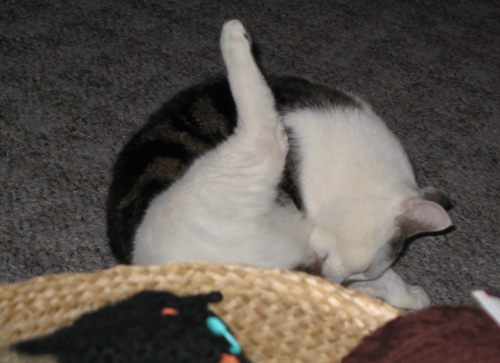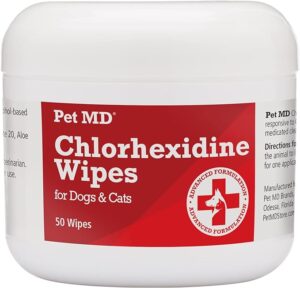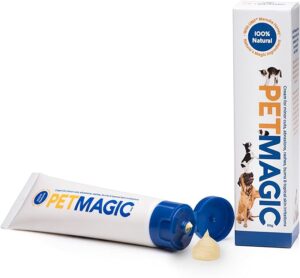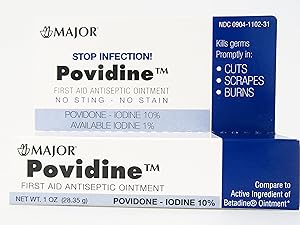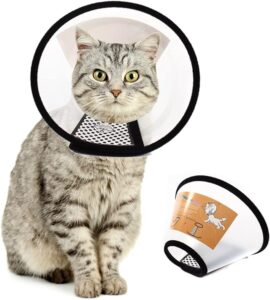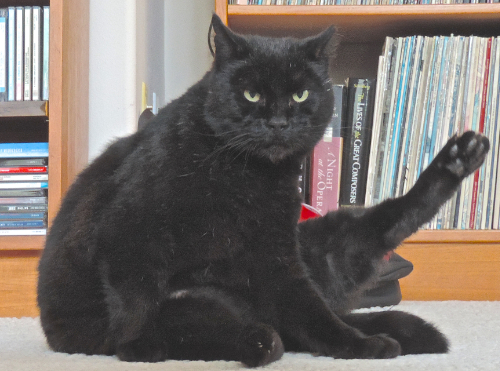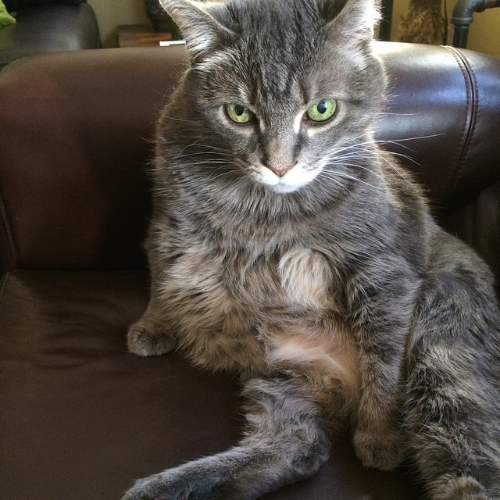Inflamed vulva skin in your cat
How to treat this?
You’ve noticed that the skin of your cat’s vulva is inflamed and now you’re worried about it. In this article we explain what you can see in your cat if her vulva skin is inflamed and what the cause could be. We also give you advice about which remedies you can use yourself to treat inflammation. Your cat will probably get rid of her inflamed vulva skin in no time if you follow our advice.
How do you recognize inflamed vulva skin in your cat?
You can recognize an inflamed vulva in your cat by the fact that the vulva looks swollen and red. Your cat is also usually quite bothered by it and will lick it a lot more than usual or groom itself excessively in her vulva region. But there are several other symptoms you may also notice if your cat has inflamed vulva skin:
- Swelling of her vulva
- Redness of the skin of her vulva
- Baldness of her vulva region
- vulva feels warmer than the rest of her skin
- There is a foul-smelling smell coming from the skin of her vulva.
- Excessive washing of that area because it makes her itchy or irritated.
- Discharge from her vulva
- Problems with urination
- Pain when urinating
- Behavioral changes
A uterine infection in your cat
A uterine infection in your cat is not the same as a vulva infection in your cat. With a uterine infection, her uterus is filled with pus and bacteria. In this article we are not talking about a uterine infection but about a vulva skin infection. Here you can read more about a uterine infection in your cat.
Causes of inflamed vulva skin in your cat
Bacterial infection
In principle, a skin inflammation of a vulva is usually a bacterial inflammation. There has probably been some damage to the skin of her vulva and a normal skin bacteria has entered the wounded skin. These bacteria will multiply and the skin will become more and more inflamed. Your cat will suffer from this and will wash her vulva excessively, causing her vulva skin to get damaged even more. This creates a vicious circle.
Incontinence
In rare cases, a cat can also be a little incontinent. Because some urine drips over her vulva skin, the skin will eventually become irritated and damaged. And from that moment on, a bacterial infection can easily arise like we mentioned above. Your cat may also have a cystitis, causing her to become somewhat incontinent. So check this with a urine test. You will find more information about this on the page about a cystitis in a cat.
Foreign object
Especially in long-haired cats, but sometimes also in short-haired cats, a foreign object such as a twig can remain in the fur around her vulva. This twig can damage her skin, causing a bacterial infection to occur.
Underlying medical problems
Underlying medical conditions such as diabetes or thyroid problems can cause reduced immunity of the vulva skin and therefore also cause less strenght against external agents in her vulva. This makes it easier for skin damage to occur.
How do you treat inflamed vulva skin in your cat?
The inflamed vulva skin almost always contains too many bacteria. These need to be addressed so that your cat can heal its own skin. You can tackle these bacteria with an ointment. But if the skin on her vulva is a bit dirty, it is best to clean it first with chlorhexidine wipes. These wipes themselves already have an antibacterial effect. But this usually does not reach deep enough into the skin. You should do this cleaning 2-3 times a day before applying an ointment.
After cleaning you can rub her vulva skin with honey ointment 2-3 times a day. Honey is known for its antibacterial effect and its tissue healing properties. Try to distract your cat for a moment after you have applied it. Then it might as well be withdrawn. For example, give your cat something tasty to eat or play with her for a while. Typically you only need to do this for 5-7 days. After that, her vulva skin should have healed again.
If the skin of the vulva is very inflamed, you can also apply iodine ointment twice a day. But make sure she doesn’t lick it because it can cause diarrhea. In that case it is best to put a protective collar on her. It is best to apply the iodine ointment twice a day for 5 days. You can also apply it for a few days longer, but it is better to opt for the honey ointment to stimulate wound healing. Iodine does not do that. It’s just a strong anti-bacterial ointment.
When do you go to the vet if the vulva skin is inflamed?
If your cat is suffering a lot from her inflamed vulva or if it seems to be getting worse despite your own treatment, it is wise to take your cat to your vet. He or she can possibly conduct further research on your cat or prescribe a course of antibiotics. If your cat has discharge from her vulva and drinks a lot, this may also indicate a uterine infection if she has not yet been neutered. This is life-threatening and in that case it is important that you take her to your own vet as soon as possible.
How do you prevent inflamed vulva skin in your cat?
You can prevent inflamed vulva skin in your cat by maintaining good hygiene. For example, the litter box must be kept very clean. And any dirt on the vulva must be cleaned as quickly as possible. For long-haired cats, make sure that the vulva region is kept short and check regularly that no dirt is stuck on the hair around her vulva. This is a source of infection.
Preventive cleaning by you as an owner is not necessary for most cats, as long as they can reach it easily with their tongue. They normally do this preventive cleaning themselves. If you have a cat that does not (or cannot) keep itself optimally clean, you can also use chlorhexidine wipes to prevent inflamed vulva skin in your cat. In principle, you can use this every day for the rest of her life.

